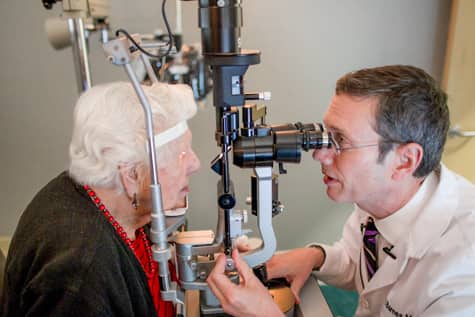Wolfe Eye Clinic is participating in clinical trials for Ranibizumab Port Delivery System (PDS), a permanent refillable eye implant that continuously administers Ranibizumab as treatment for wet age-related macular degeneration (AMD). Results from these studies show that Ranibizumab PDS may be a new treatment option for patients and may decrease burdens associated with frequent eye injections.
There is a new hope around the corner for Iowans suffering from wet age-related macular degeneration (AMD). Positive results from Phase III Archway Study trial were released late May 2020, showing promise for a new wet AMD treatment method that may significantly reduce the burden of frequent eye injections for many patients1. Wolfe Eye Clinic participated as Iowa’s sole trial site for the Archway Study which has been examining the effectiveness of a permanent refillable eye implant, Port Delivery System with ranibizumab, also known as PDS.
Wet age-related macular degeneration (AMD), also referred to as neovascular AMD, is an eye disease that attacks the macula, located on the back of the eye near the center of the retina. Responsible for central vision and ability to see fine details, a healthy macula is crucial to good, clear vision and functional everyday living. Left untreated, wet AMD can progress quickly over months or years – distorting central vision or worse yet, eliminating it completely. According to Centers for Disease Control and Prevention, wet AMD is a leading cause of severe vision loss worldwide in adults age 65 and older2.
 Due to the aggressive nature of wet AMD, treatment can be a heavy burden for Iowans suffering from the age-related eye disease and loved ones who care for them. The current standard wet AMD treatment consists of anti-vascular endothelial growth factor (VEGF) eye injections administered by a retina specialist as frequent as every month3. Anti-VEGF injections help slow or stop the growth of abnormal blood vessels from forming into the macula which in turn helps slow down the blood vessel fluid that leaks and causes scar tissue that damages the retina1.
Due to the aggressive nature of wet AMD, treatment can be a heavy burden for Iowans suffering from the age-related eye disease and loved ones who care for them. The current standard wet AMD treatment consists of anti-vascular endothelial growth factor (VEGF) eye injections administered by a retina specialist as frequent as every month3. Anti-VEGF injections help slow or stop the growth of abnormal blood vessels from forming into the macula which in turn helps slow down the blood vessel fluid that leaks and causes scar tissue that damages the retina1.
In the near future, frequent eye injections may not be the only option for patients with wet AMD as positive results from the Archway Study challenge the status quo for wet AMD treatment. Phase III trial results indicate that patients being treated with the new Port Delivery System (PDS) with ranibizumab show equivalent outcomes to patients being treated with monthly ranibizumab eye injections1. In the study, both treatment methods administered ranibizumab, an anti-VEGF medication, in some variation. However, rather than being injected into the eye, the Archway Study examined the effectiveness of a customized formulation of ranibizumab being continuously released into the eye through the implanted Port Delivery System. This refillable device is slightly larger than a grain of rice and only requires refilling every six months for most patients. Trial results using PDS show promising and effective outcomes. Furthermore, PDS may reduce barriers to wet AMD treatment and thus, encourage patient treatment follow-through.
Data from the Archway Study will be presented and submitted to health experts across the globe in the near future. Wolfe Eye Clinic was honored to be Iowa’s only Phase III trial site for the new device that helped several of our patients and may change the course of wet AMD treatment all-together.
“It’s exciting to have some real innovation in treatment for our patients who suffer with wet AMD,” said Jared Nielsen, MD, MBA, Retina Specialist and Director of Retinal Clinical Trials at Wolfe Eye Clinic. “While the current injection therapy is effective, the treatment burden for many of our patients and caregivers is too high. Our patients who have received the implant have done exceptionally well. The PDS is going to offer an effective option for eyes that require frequent injections— reducing visits and eliminating the injections. It is great to be able to have this as an option.”
Wolfe Eye Clinic fellowship-trained retina specialists in Iowa participate in many nationwide clinical studies and train retina surgeons to help advance retinal disease technology, treatment and outcomes. The clinic is participating in ongoing evaluation of ranibizumab PDS in the long-term wet AMD Portal trial and for diabetic retinopathy in the Pagoda and Pavillion protocols. Wolfe Eye Clinic retina specialists offer expertise in managing and treating a range of retinal diseases across the state of Iowa including wet AMD, diabetic eye diseaseand retinal detachment. If you have any retina-related questions or would like to set up an appointment, please give us a call at (833) 474-5850.
- 1.Genentech. Port Delivery System with Ranibizumab Shows Positive Phase III Results in Neovascular Age-Related Macular Degeneration. https://www.gene.com/media/press-releases/14854/2020-05-26/port-delivery-system-with-ranibizumab-sh. Published May 26, 2020. Accessed June 2, 2020.
- 2.CDC. Learn About Age-Related Macular Degeneration. Available at https://www.cdc.gov/features/healthyvisionmonth/index.html. Published July 18, 2018. Accessed June 4, 2020.
- 3.AMDF. Eylea Injection Treatment of Macular Degeneration. Available at https://www.macular.org/eylea-injection-treatment. Accessed June 4, 2020.
Kyle J. Alliman, M.D.
Paul S. Boeke, M.D.
Alex Kartvelishvili, M.D.
Jared S. Nielsen, M.D.
David D. Saggau, M.D.